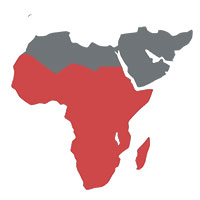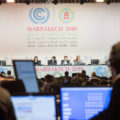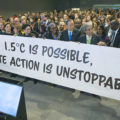COP22: Does the “Spirit of Paris” Live On?
Linh Do | November 19, 2016.
Negotiators arrived in Marrakech, Morocco for this year’s UN climate conference, bathed in the glow of a year of climate action, and began work on an optimistic note. Instead of a lively return to action in the “spirit of Paris”, though, COP22 quickly became bogged down in technicalities.
The initial adoption and then entry into force of the Paris Agreement had been followed by other successes, such as an agreement to phase out potent greenhouse gasses used in refrigerators and a decision to cap aviation emissions for the first time.
Midway through the first week, though, US elections brought to earth talk of momentum and high ambition. President-elect Donald Trump has frequently threatened to “cancel the Paris Agreement”, and his election caused many to fear for the future of international climate action.
Fortunately, one clear message emerged in the following days; with or without the cooperation of president-elect Trump, the Paris Agreement and climate action would continue. Fifteen new ratifications of the Paris Agreement rolled in over the course of the negotiations, signalling the triumph of international pressure over political uncertainty. Notable ratifications came from Australia, Japan and the United Kingdom. Further global support for climate action was reiterated through the Marrakech Action Proclamation.
In addition to international support, “the Paris Agreement will only be effective if nations increase their domestic commitments” according to Mohamed Adow from Christian Aid. Civil society groups have been pushing for developed countries to release long-term decarbonisation plans. Four nations released their plans to become net-zero carbon economies by 2050, with Germany being the first to release a mid-century plan. Canada, Mexico and the United States showed their commitment to North American cooperation by announcing their respective strategies at a joint-event.
Perhaps the most audacious moment of the Marrakech conference came from the Climate Vulnerables Forum, a coalition of countries that will experience disproportionately high impacts from climate change. On the final day of the conference, the Forum demonstrated their moral leadership by releasing the Marrakech Vision. In it, they outlined their commitment to increasing their pre-2020 ambition, pledged to move to 100 per cent renewable energy by 2050 and affirmed the belief that development and clean energy can thrive together.
The ambition of the 48 member countries of the Climate Vulnerables Forum alone is not enough, though. Comparable levels of commitment are also required from developed countries.
“The science is clear, and there are only three years before the Paris Agreement’s goal of 1.5°C is beyond our reach,” said Asad Rehman of Friends of the Earth.
As the negotiations ran late into Friday night, it was not immediately apparent that government negotiators had kept this in mind though. What was intended as the “action COP” instead devolved into argy bargy over age-old sticking points: finance, adaptation and loss and damage.
“Countries found themselves at loggerheads over what was actually agreed after the jubilation over the Paris Agreement’s entry into force,” according to Meena Raman of Third World Network.
The various texts and decision documents were all eventually adopted through a murky process of consensus-meets-diplomacy. However, this did not address lingering questions over pre-2020 action or developing country expectations of developed countries.
With Fiji as the incoming president for the next meeting, 2017 will be key to defining the foundations of the 2018 global stocktake. Still two years away, that meeting will be a defining moment for post-2020 ambition.
As implementation of the Paris Agreement becomes a reality, COP22 has highlighted the pressing need to resolve the perennially divergent opinions. Governments need to reconcile climate change’s historical inequities and balance the competing priorities of adaptation and mitigation.
If the contentious end to COP22 is anything to go by, these underlying issues cannot be ignored in 2017.
With reporting from Andrés Fuentes, Kya Lal and Forrest Watkins.













comment